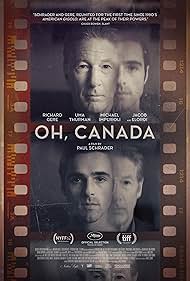Based on the novel 'Foregone' ; by Russell Banks
Leonard Fife, one of sixty thousand draft dodgers and deserters who fled to Canada to avoid serving in Vietnam, shares all his secrets to de-mythologize his mythologized life.. This is the second time Paul Schrader has directed one of Banks' novel for the screen, following its adaptation Affliction (1997).. Featured in Film Junk Podcast: Episode 961: In a Violent Nature + TIFF 2024 (2024). Richard Gere is a respected creator of gritty, dirty documentaries. He works with his wife and produces Uma Thurman.
This film may have autobiographical points
He fled the United States many years ago to protest the Vietnam War. It is now 2023, he is dying, and several of his students are making a documentary, interviewing him during protests and under the watchful eye of his producer and wife, Uma Thurman. Schrader is a careful writer and there are several ways to interpret this film. Certain critics called it "autobiographical" because they are so intellectually lazy that they can’t be bothered to think more than one thought before giving up. Surely the film reflects Schraeder’s opinions, not, say, the opinions of a panda bear, or the opinions of a large boulder scraped off the Laurentian Shield into Long Island’s terminal moraine.
There are filmmakers and filmmakers
I believe that doesn’t make it autobiographical, nor does the fact that the guy is a director. Although Gere and the people making the movie-within-a-movie want to make a sensational movie regardless of the cost, Miss Thurman’s only desire is to protect her husband, even though she already knows the worst. he wondered if this was a meditation on the making of the film itself. It certainly has aspects of that. A director will shoot far more footage than he needs, and edit it into a final form that may or may not bear any relation to reality or the original intentions of the director.
Schraeder, on the other hand, seems embittered, filled with despair, and leaves a mess for the hapless survivors to clean up
As Gere dies on camera and during the film, the events of his life that he wants to tell appear confusingly and awkwardly, mixing and confabulating with each other. To make sense of it, to make a movie about it — because the guys from the movie already have a deal to sell the movie — they’re going to need an editor. That is the true job of any storyteller: to arrange the events and characters within the story so that it makes sense to the audience. But more important to understanding this film is to see that, like others in Schraeder’s body of work, it is primarily concerned with anger. In a way, his work resembles the work of Ingmar Bergman: brought up religiously, he thought about human mistakes in a world without G-d to provide an objective framework of right and wrong: confusion and disappointment, leaving the audience with the question of how to solve it with a moral system.
It’s not Gere’s problem: he’s dead
Gere leaves it to the filmmakers to make sense of his interview, and to Miss Thurman to clean up the mess and lies he’s made of his life. And it’s not Schraeder’s. Anyway, those are a few ways to watch the movie that I came up with. If you see the movie, despite the fact that there are no explosions or good jokes, let me know if they make sense to you. And if you have different interpretations, too.




 27/49
27/49